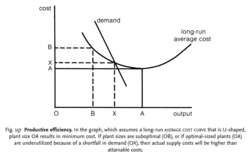In particular, if all firms are assumed to be symmetric, competition cannot enhance
productive efficiency via selection.
Evidence of
productive efficiency gains and allocative efficiency losses are generally mixed.
The use of this supplementary information in a standardized form facilities the estimation of
productive efficiency and potential, which provide a useful basis for sound plan decision making.
The pollution level in an industry is really a measure of its
productive efficiency, the higher the pollution level, the lower the
productive efficiency.
To improve
productive efficiency and to reduce costs in Indian industry the author advocates a gradual relaxation of import controls and a reduction in the effective degree of protection along with a liberal approach to induction of technology from abroad.
The ministry's statement pointed to the strengthening of the value added chain, development of the
productive efficiency and competitiveness of national industrial products in the internal and external market as well as raising of capability building of the workforce in the sector.
bottom-up benchmarking in natural monopoly regulation in a case involving Chile and the UK, labor productivity change estimates as an input for X-factors, efficient firm standards in Chilean monopoly regulation, estimation of
productive efficiency based on non-parametric techniques in the case of electricity distribution in Argentina, a distance function approach in the case of the evolution of Mexico's port efficiency, computable general equilibrium models applied to regulatory economics and the effective of competition policy in Argentina, Chile and Peru in the 1990s.
The answer is that surveys carried out by Nose (the Nonsense School of Economics) ( which counts a great many bureaucrats and senior politicians among its alumni ( demonstrate that surrounding businesses with many new and complicated regulations has absolutely no effect on
productive efficiency.
While
productive efficiency considerations argue in favor of early licensing, delays in the granting of patent rights induce an informational asymmetry between the inventor and potential licensees.
Four criteria that have been suggested to evaluate the effects of private schooling and education vouchers are: (1) freedom of choice; (2)
productive efficiency; (3) equity; and (4) social cohesion.
Indeed, in the debates of the 1980s over the purposes of antitrust, almost all participants recognized efficiency (including both allocative efficiency and
productive efficiency) as a principal goal of the law; the debate was over whether efficiency concerns exhausted the law's purposes or whether the law also was concerned with some nonefficiency issues, such as the dispersion of economic power and the distribution of income.(31)
